Install the operating system
This document introduces how to install Android image to Rock 3B.
Rock 3B can boot from microSD card, eMMC, SSD, so install os on microSD card, eMMC or SSD based on your choose.
- Install OS on microSD card/eMMC
- Install OS on SPI-NVME
Before starting ROCK 3B using microSD card/eMMC, it is necessary to erase the SPI as follows:
-
Please go to Download Summary to download image.
-
Enter maskrom mode
- Disconnect the board from the power supply.
- Remove the SD card, NVME SSD and insert the eMMC module.
- Connect the USB3.0 port of the Radxa ROCK 3B to the PC side with USB cable.
- Short circuit Maskrom Key with DuPont wire to power on the development board.
- Check for USB devices
- Linux/macOS: Check if "Bus 001 Device 112: ID 2207:350a Fuzhou Rockchip Electronics Company" is displayed after running lsusb.
- Windows: Open RKDevTool and you will see the device in "maskrom mode".
- Unplug the short DuPont wire
- Erase SPI as follows
- Windows
- Linux/Mac
Windows use rkdevtool
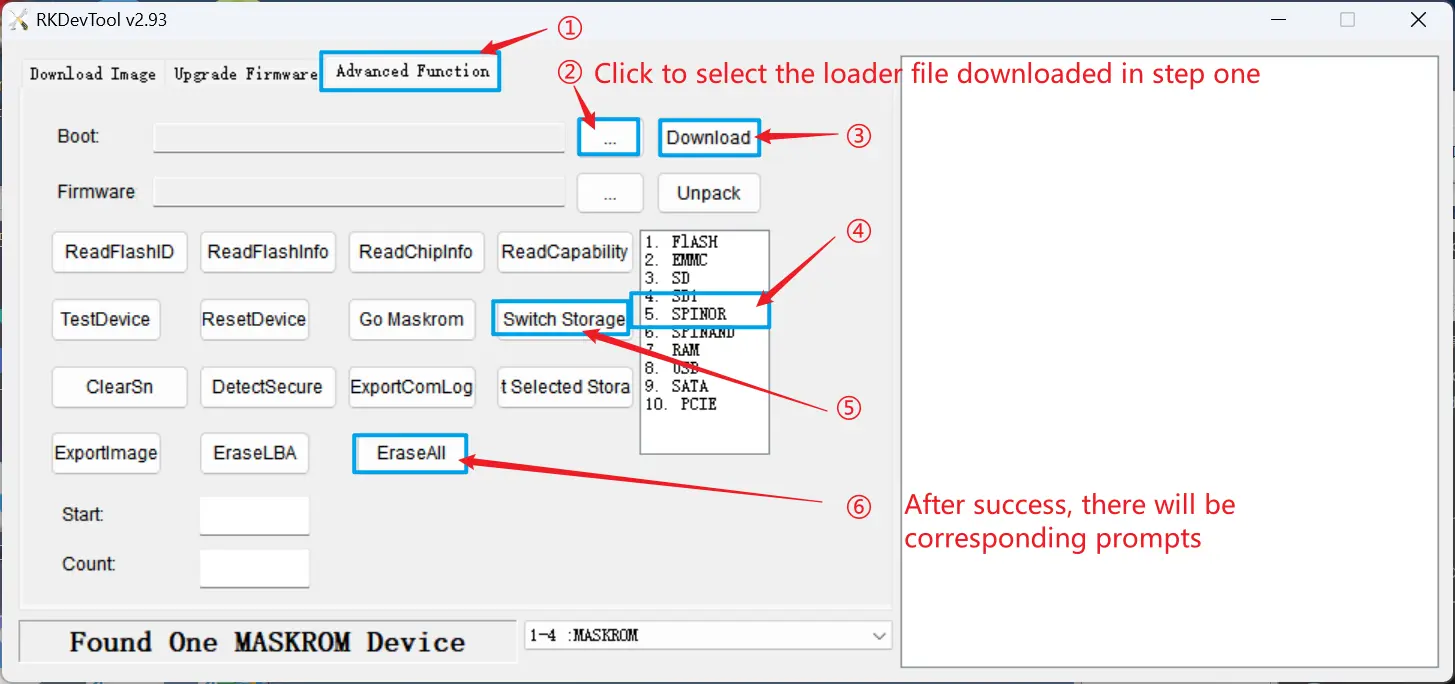
Linux/Mac use rkdeveloptool
dd if=/dev/zero of=zero.img bs=16M count=1
rkdeveloptool db rk3588_spl_loader_v1.15.113.bin (select the loader file downloaded in step 1)
rkdeveloptool wl 0 zero.img
rkdeveloptool rd
Preparation
- 1x microSD card / eMMC(capacity >=8GB)
- 1x microSD card / eMMC reader
- 5V power adapter (recommended [Radxa Power PD30W] (/accessories/pd-30w))
Image Download
Please go to Resource Download to download the corresponding image file.
Install the system
We recommend using the open-source image flashing tool Etcher, developed by our partner Balena. Etcher has a user-friendly interface and powerful features, with support for Windows, Linux, and macOS systems. Next, we'll show you how to use Etcher to write an image to an SD card.
- Download Etcher and install it.
- Windows
- Linux
Please download balenaEtcher-Setup-1.18.11.exe After the download is complete, there is no need to perform any additional actions. After downloading, you can double click it to open it without any additional operation.
Please download balena-etcher_1.18.11_amd64.deb. Once the download is complete, please install it by executing the following command in the terminal:
sudo dpkg -i balena-etcher_1.18.11_amd64.deb
-
Open Etcher
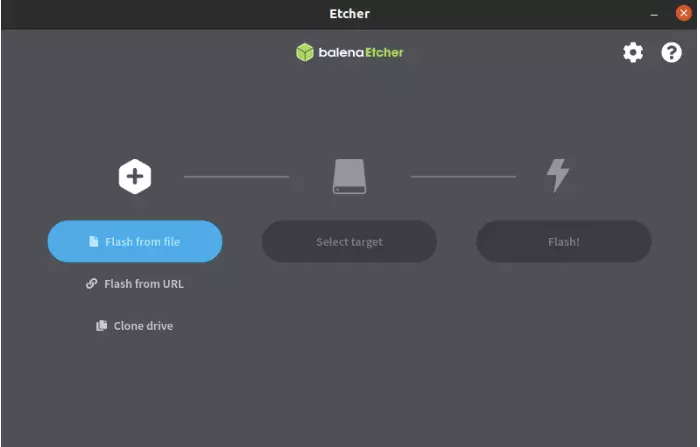
-
Open Etcher and click
Flash from fileto select the image to write to.
-
Click
Select targetto select the device, please select carefully.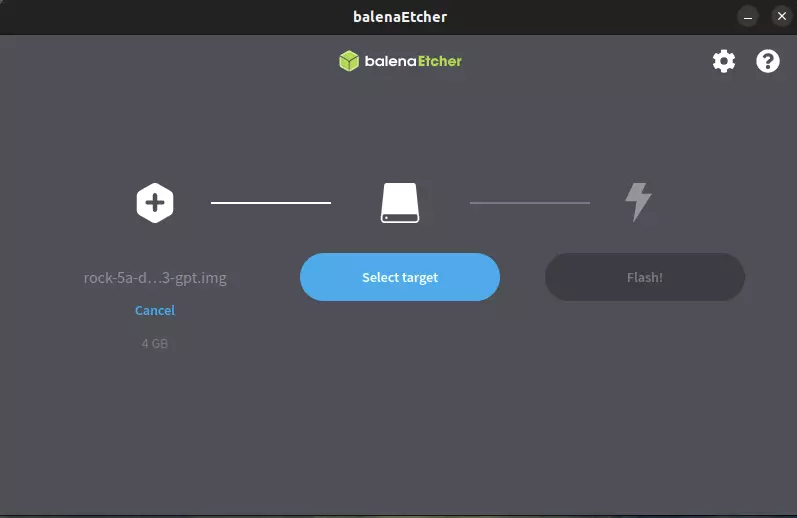
-
Click
Flash!Start writing and wait for the write progress bar to complete.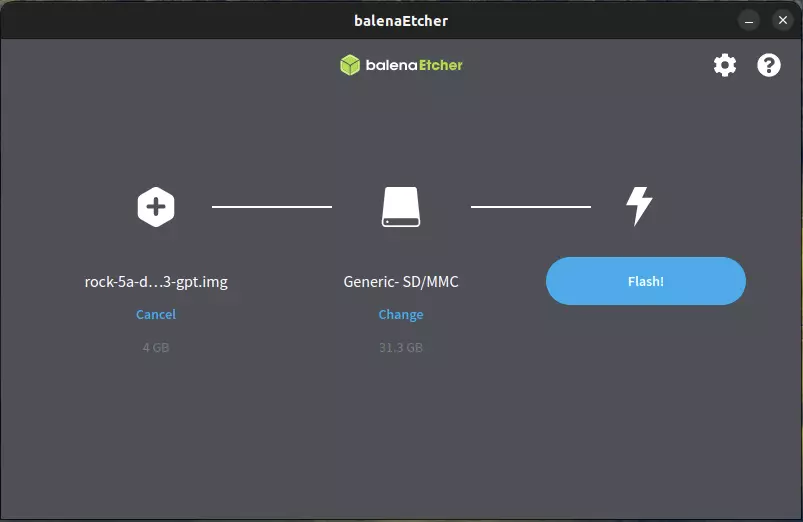
-
When writing the image successfully, Etcher will display
Flash Complete!.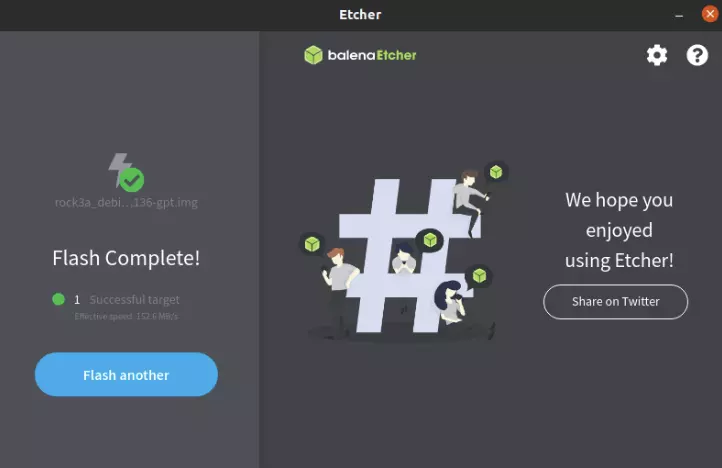
**If there is an error in flashing, please try again. **
- Starting the system
After successfully burning the microSD card according to the above steps, insert the microSD card into the MicroSD slot of (as shown below), power on the system with the power adapter, and then the system will start booting and HDMI will display the desktop.
- Logging in to the system
After the system has started, log in using the radxa account with the password radxa.
Start the system
- After successfully burning the microSD card/ eMMC as described above, insert the slot of the ROCK 3B.
- The power supply interface of ROCK 3B is USB 2.0 OTG Type C port, please use Type-C cable to connect the power supply port and the adapter.
Radxa ROCK 3B supports QC 3.0/2.0 adapter, 9V/2A, 12V/1.5A. Radxa recommends using the Radxa Power PD30W.
Preparation
Prepare the installation media
- 1x NVME ssd (M.2)
Prepare the image file
Please go to Resource Download to download image.
System installation
- Connect the micro usb cable to the host computer.
- Enter Maskrom mode.
- Disconnect power to the board
- Remove the SD card,eMMC module and insert the NVME SSD.
- Connect the USB3.0 port of the Radxa ROCK 3B to the PC with USB A-A.
- Short the Maskrom key.
- Power up the board.
- Unplug the short DuPont wire
- Linux
- mac
- Windows
Install rkdeveloptool
rkdeveloptool is Rockchip's software for USB burning on Linux/macOS platforms.
The rkdeveloptool can be thought of as an upgrade_tool for the open source version.
If your operating system does not provide rkdeveloptool, you will need to compile and install it from source.
- Debian
- Ubuntu
- ArchLinux
Execute the following command from the command line to install:
sudo apt-get update
sudo apt-get install -y libudev-dev libusb-1.0-0-dev dh-autoreconf pkg-config libusb-1.0 build-essential git wget
git clone https://github.com/rockchip-linux/rkdeveloptool
cd rkdeveloptool
autoreconf -i
./configure
make -j $(nproc)
sudo cp rkdeveloptool /usr/local/sbin/
Execute the following command from the command line to install:
sudo apt-get updateOn Ubuntu 22.10 and later you can install it from the command line: sudo apt-get install rkdeveloptool
sudo apt-get install -y libudev-dev libusb-1.0-0-dev dh-autoreconf pkg-config libusb-1.0 build-essential git wget
git clone https://github.com/rockchip-linux/rkdeveloptool
cd rkdeveloptool
autoreconf -i
./configure
make -j $(nproc)
sudo cp rkdeveloptool /usr/local/sbin/
Enter Maskrom Mode
Using rkdeveloptool
Write to a file
rkdeveloptool does not automatically decompress compressed files when writing to them.
You must first extract the used files and specify the extracted files in rkdeveloptool.
rkdeveloptool does not support the selection of a Maskrom device, nor the selection of a storage medium to be written to. Normally, when using rkdeveloptool, only one device and one storage medium are connected in hardware. This step cannot be controlled by software.
If you need to write to multiple devices at the same time, use upgrade_tool.
- Extract the image file (See File Download above for details of the image file, here rock_debian_bullseye-_desktop_release_b1.img.xz is used as an example)
xz -d rock_debian_bullseye-_desktop_release_b1.img.xz (if the image file is gz format,then use `gunzip -d xxx.gz` command)
- Flash Loader(See File Download above for details of the loader file,here rkxxxx_spl_loader_v1.xxx.bin is just an example)
sudo rkdeveloptool db rkxxxx_spl_loader_v1.xxx.bin
- Flash System Image (Here rock_debian_bullseye-_desktop_release_b1.img is an example, use the file got from step1 as a replacement)
sudo rkdeveloptool wl 0 rock_debian_bullseye-_desktop_release_b1.img
Reboot
sudo rkdeveloptool rd
Login
After rebooting the device, you can log in to the system via HDMI or serial port.
Install rkdeveloptool
rkdeveloptool is Rockchip's software for USB burning on Linux/macOS platforms.
The rkdeveloptool can be thought of as an upgrade_tool for the open source version.
If your operating system does not provide rkdeveloptool, you will need to compile and install it from source.
Please install Homebrew first and then run the following command from the command line to install it:
brew install automake autoconf libusb pkg-config git wget
git clone https://github.com/rockchip-linux/rkdeveloptool
cd rkdeveloptool
autoreconf -i
./configure
make -j $(nproc)
cp rkdeveloptool /opt/homebrew/bin/
Enter Maskrom Mode
Using rkdeveloptool
Write to a file
rkdeveloptool does not automatically decompress compressed files when writing to them.
You must first extract the used files and specify the extracted files in rkdeveloptool.
rkdeveloptool does not support the selection of a Maskrom device, nor the selection of a storage medium to be written to. Normally, when using rkdeveloptool, only one device and one storage medium are connected in hardware. This step cannot be controlled by software.
If you need to write to multiple devices at the same time, use upgrade_tool.
- Extract the image file (See File Download above for details of the image file, here rock_debian_bullseye-_desktop_release_b1.img.xz is used as an example)
xz -d rock_debian_bullseye-_desktop_release_b1.img.xz (if the image file is gz format,then use `gunzip -d xxx.gz` command)
- Flash Loader(See File Download above for details of the loader file,here rkxxxx_spl_loader_v1.xxx.bin is just an example)
sudo rkdeveloptool db rkxxxx_spl_loader_v1.xxx.bin
- Flash System Image (Here rock_debian_bullseye-_desktop_release_b1.img is an example, use the file got from step1 as a replacement)
sudo rkdeveloptool wl 0 rock_debian_bullseye-_desktop_release_b1.img
Reboot
sudo rkdeveloptool rd
Login
After rebooting the device, you can log in to the system via HDMI or serial port.
Install RKDevTool
RKDevTool is Rockchip's software for USB burning on Windows platform. If RKDevTool is not installed on your Windows host, please follow the steps below to install it.
Please download and extract the following files to install RKDevTool:
- RKDevTool v2.96 (Includes Chinese documentation)
- DriverAssistant v5.0
Installation of drivers
Download and unzip DriverAssistant, then execute DriverInstall.exe and click the Install Driver button to install the driver.
If you have already installed another version of driver, please click Uninstall Driver to uninstall the driver first, and then reinstall it again.
Install RKDevTool
unzip RKDevTool_Release_v2.96_zh.zip ,click RKDevTool.exe to open.
Enter Maskrom mode
If the operation is normal, RKDevTool will prompt A MASKROM device was found.
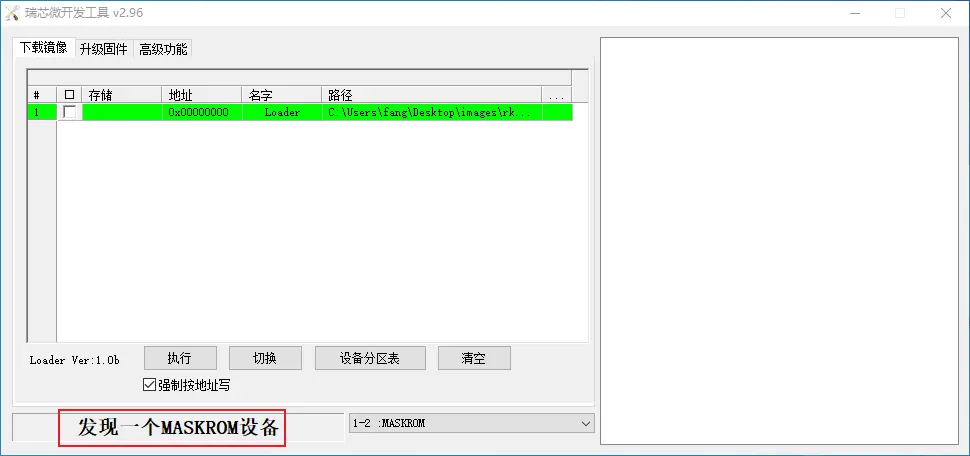
Follow the steps below to flash the operation image
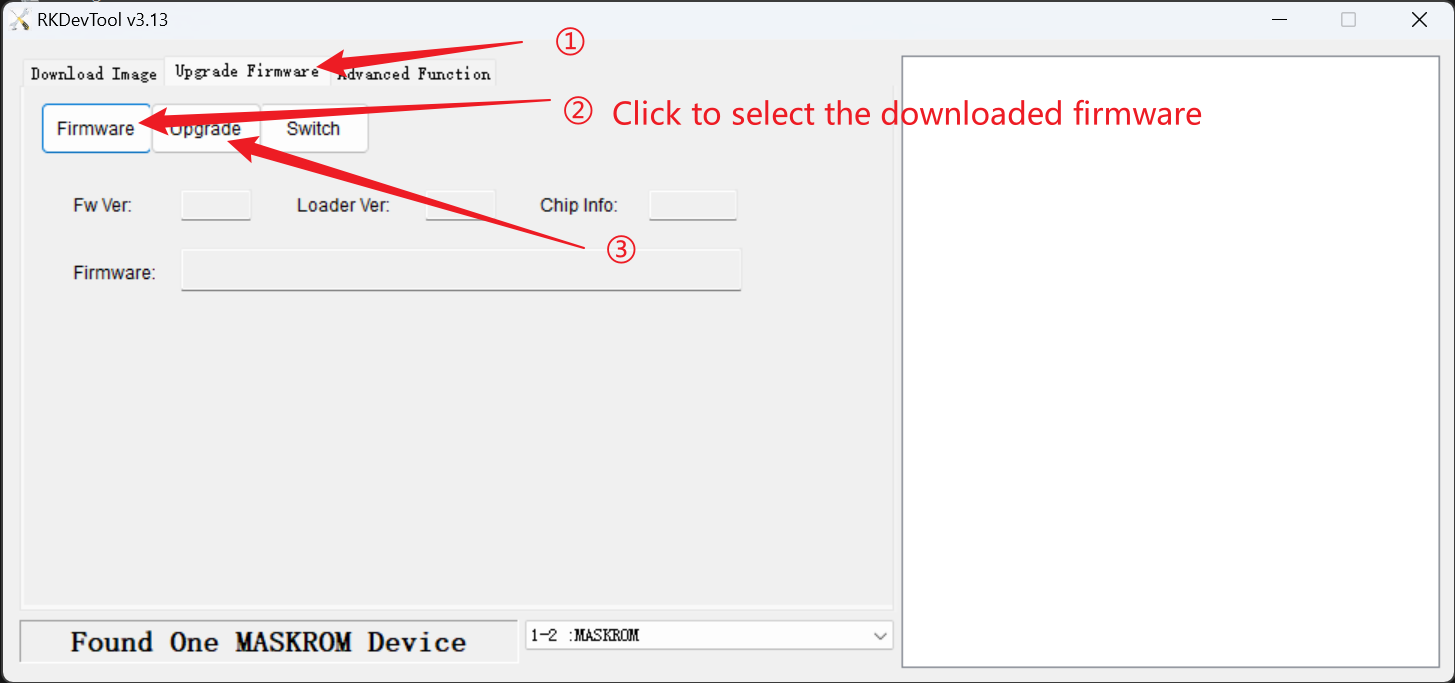
System startup
Rock 3B
- Power on the Rock 3B via the DC adapter.
- The Rock 3B will boot up with the green power LED on.